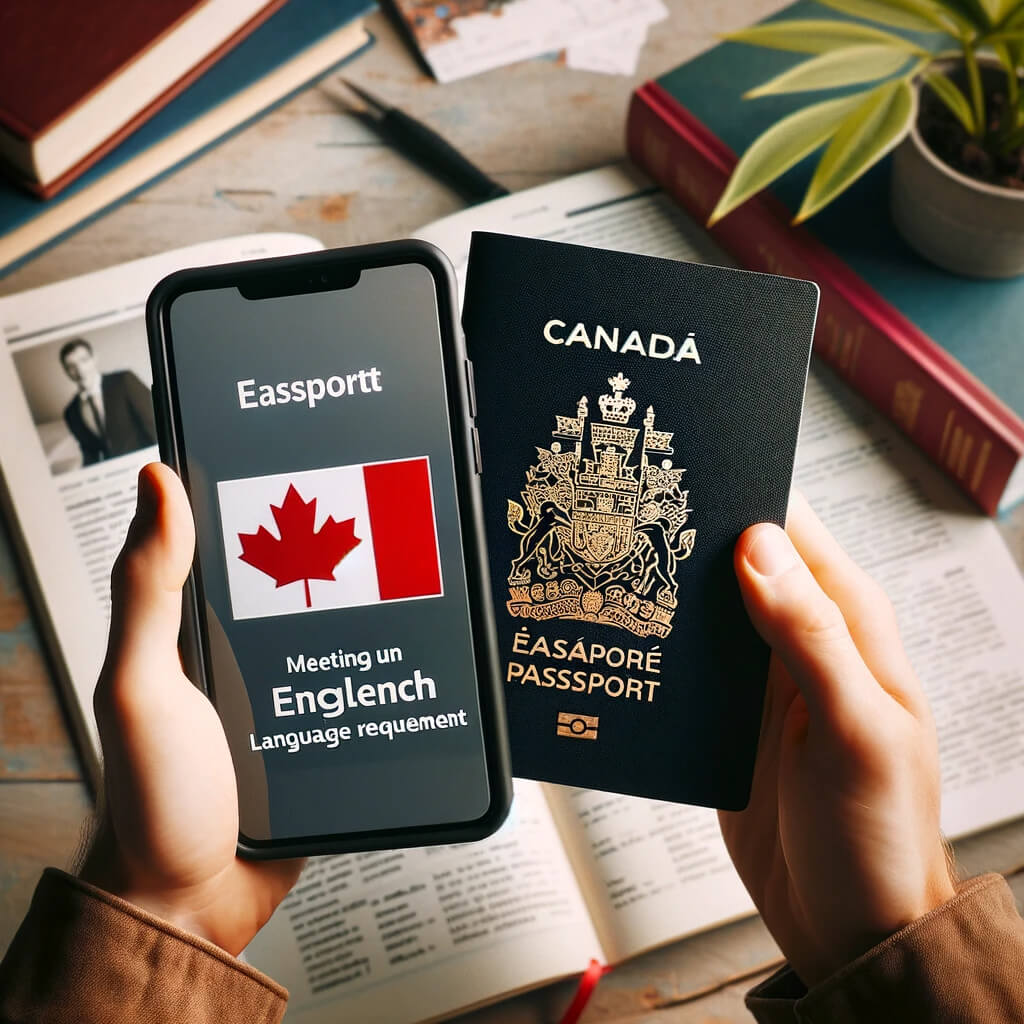Canada Citizenship Language Requirement: Your Pathway to Success
Your Quick 30-Second Answer about
The Canada citizenship language requirement mandates that applicants aged 18 to 54 must demonstrate proficiency in either English or French, Canada's official languages. This involves passing tests like IELTS or TEF, or providing educational credentials from English or French-speaking institutions. The minimum level required is the Canadian Language Benchmarks (CLB) Level 4 for speaking and listening. Exceeding these minimum levels aids in employment and social integration within Canadian society. Exceptions apply for those outside the specified age range or with certain medical conditions. Preparation through government-funded language programs is encouraged. Successfully meeting these language requirements signifies a crucial step towards integrating into Canada's cultural and social life.
For an in-depth overview, please see the "Table of Contents" below.
Understanding the Canada Citizenship Language Requirement
Welcome to our comprehensive guide on the Canada citizenship language requirement, your essential resource for navigating this crucial step in the citizenship journey.
Table of Content
Citizenship Language Requirements
1. Why should I Use this Guide?
2. Language Requirements Citizenship
3. Proving Language Proficiency
4. PR Language Requirements
Testing and Evaluation Process
5. Language Tests for Citizenship
6. Additional Considerations
7. Key Points for Language Requirements
Conclusion and Support
8. Final Thoughts Language Requirements
9. Common Questions (FAQs)
10. Additional Resources

1. Who should use this Guide and Why?
This guide is your secret weapon to Canadian permanent residence. Primarily, this guide is for anyone who wants to learn about immigration to Canada. If you find the official rules and documents about the requirements to move to Canada confusing, this guide can be your helpful friend.
If you're aged 18 to 54 and aspire to be a Canadian citizen, you must demonstrate language proficiency in either English or French, Canada's official languages. This requirement is vital as it ensures that new citizens can actively participate in all aspects of Canadian life, from employment opportunities to engaging in community and civic activities.
The Canadian Language Benchmarks (CLB) serve as the standard for assessing language proficiency. To meet the Canada citizenship language requirement, you must show you can speak and listen at the CLB Level 4 or higher. This level represents a basic but adequate knowledge of the language, sufficient for everyday conversations and understanding simple instructions, questions, and expressions.
Canada Citizenship Language Requirement: Key Points
The Canada citizenship language requirement is crucial for applicants seeking Canadian citizenship. Understanding this requirement is vital as it impacts your application process and integration into Canadian society.
Eligibility Criteria
- Age Group: Applicants between 18 and 54 years must meet the language requirements.
- Language Proficiency: Demonstration of adequate knowledge in either of Canada's official languages - English or French.
Proof of Language Proficiency
- Accepted Tests: IELTS (International English Language Testing System) for English and TEF (Test d’Évaluation de Français) for French.
- Educational Credentials: Diplomas, degrees, or certificates from English or French-speaking institutions can be accepted as proof.
Canadian Language Benchmarks (CLB) Levels
- Required Level: The minimum requirement is CLB Level 4 for speaking and listening skills.
- Exceeding Minimum Levels: Higher language proficiency levels can significantly enhance your ability to integrate into the Canadian workforce and community.
Integration into Canadian Society
- Role of Language Skills: Proficiency in English or French facilitates better employment opportunities, social engagement, and access to educational resources.
- Cultural Immersion: Language proficiency aids in understanding Canadian culture, values, and participating effectively in community and civic activities.
Special Considerations
- Age and Health: Applicants under 18 or over 54, and those with certain medical conditions, may be exempt.
- Language Training Programs: Government-funded language programs are available to help applicants meet the language requirements.
Canadian Citizenship Application Process
- Documentation: Ensure all necessary language proof documents are correctly submitted.
- Preparation: Utilize available practice tests and resources to achieve the required language proficiency.
Proving Your Language Proficiency
When submitting your citizenship application, including proof of language proficiency is essential. This can take various forms:
- 1. Results of an IRCC-approved third-party test: These include the International English Language Testing System (IELTS) for English and the Test d’Évaluation de Français (TEF) for French. For IELTS, you need a score of 4.5 or higher in listening and 4.0 or higher in speaking. For TEF, a score of B1 or higher in listening and speaking is required.
- 2. Educational documents: Proof of completion of secondary or post-secondary education in English or French, either in Canada or abroad, can also be submitted. This includes diplomas, transcripts, or certificates, which must be in English or French or accompanied by a certified translation.
The Importance of Language Proficiency
Language proficiency is not merely a box to check off on your path to Canadian citizenship; it's a cornerstone of successful integration into Canadian society. Understanding and speaking one of Canada's official languages is crucial for several reasons:
- 1. Community Engagement and Social Integration: Language skills are vital for forming connections within your community. They enable you to participate in local events, engage with neighbors, and understand Canadian cultural nuances.
- 2. Access to Educational Resources: For those wishing to pursue further education, proficiency in English or French is essential. Whether it's a high school course, a single course at a local community college, or a post-secondary education program, language proficiency is key to understanding and excelling in academic environments.
- 3. Involvement in the Democratic Process: As a Canadian citizen, you have the privilege of participating in the democratic process. Language proficiency enables you to understand political discussions, participate in debates, and make informed decisions during federal elections.
- 4. Legal and Administrative Navigation: Understanding legal and administrative documents is crucial, especially when dealing with immigration matters, filing income taxes, or understanding your rights and responsibilities under the Canadian law. Proficiency in one of the official languages aids in navigating these often complex processes with confidence.
Fulfilling the Canada citizenship language requirement is more than a formality; it's about integrating into the Canadian fabric. By demonstrating your language skills, you're not just complying with a legal requirement; you're preparing yourself to be an active, contributing member of the Canadian society.
2. Language Requirements for Canadian Citizenship

Official Language Requirements for Canadian Citizenship
To apply for Canadian citizenship, an applicant must demonstrate an adequate knowledge of English or French. This requirement ensures that new citizens are well-prepared to actively participate in Canadian life. The Canadian government has outlined specific criteria to assess this language proficiency.
Applicants must provide proof of language ability in one of the two official languages. This proof can come in various forms such as results from an approved language test, a degree certificate from a program conducted in English or French, or a Canadian Language Benchmarks (CLB) level assessment for English. For French, the equivalent is the Niveaux de compétence linguistique canadiens (NCLC).
The language tests accepted by the Canadian government for citizenship canada applications include the International English Language Testing System (IELTS) for English and the Test d’évaluation de français (TEF) for French. These tests assess an individual’s ability to listen, speak, read, and write in the chosen language.
To qualify, an adult applicant must achieve a minimum of CLB/NCLC level 4 in speaking and listening. This level indicates a basic proficiency, enabling the applicant to understand simple instructions, questions, and expressions, and communicate basic information.
For those in unique circumstances, such as having a medical condition that impairs language ability, there may be exceptions. However, these are evaluated on a case-by-case basis by the Canadian citizenship office.
Understanding the Role of Language in Canadian Citizenship
Language proficiency is a cornerstone in the journey towards becoming a Canadian citizen. The ability to communicate effectively in one of Canada’s official languages, English or French, is not only a requirement but a crucial element in integrating into Canadian society. This linguistic proficiency reflects the cultural and social ethos of Canada, emphasizing the importance of inclusion and diversity.
In the context of Canadian citizenship, language is more than just a means of communication. It represents a connection to the community, a pathway to engage in the social, economic, and political life of the nation. Understanding and being understood in English or French opens doors to countless opportunities, from employment to social interaction, and even to the effective exercise of one's rights and responsibilities as a citizen.
the Canada citizenship language requirement plays a vital role in the process of becoming a citizen. It not only ensures that new citizens can engage fully in Canadian life but also upholds the values of diversity and inclusivity that are fundamental to the Canadian identity.
3. Proving Language Proficiency

The process of proving language proficiency is a crucial step in meeting the Canada citizenship language requirement. Understanding the accepted forms of language proof, the details of official language tests and scoring, and considering special provisions for proof based on educational and professional backgrounds are essential for any citizenship applicant.
Accepted Forms of Language Proof
To demonstrate proficiency in Canada's official languages, several forms of language proof are acceptable. If you are between 18 and 54 years old, you must provide evidence of your language skills. The Canadian government accepts the following as valid proof:
1. Results of IRCC-Approved Third-Party Tests: These include the International English Language Testing System (IELTS) for English and the Test d’Évaluation de Français (TEF) for French. The results from these tests provide a reliable measure of your language abilities.
2. Educational Documents: If you have completed secondary or post-secondary education in English or French, either in Canada or abroad, you can submit your diploma, transcript, or certificate as proof of your language proficiency.
3. Government-Funded Language Training Programs: Proof from certain language training programs, funded by the government, is also considered valid evidence of language proficiency.
Official Language Tests and Scoring
Understanding the scoring system of language tests is crucial for meeting the Canada citizenship language requirement. The Canadian government recognizes the following benchmarks:Special Considerations for Proof
1. IELTS: For the IELTS General Training test, a score of 4.5 or higher in listening and 4.0 or higher in speaking is required.
2. TEF: For the TEF, a score of B1 or higher in listening and speaking is needed.
Special Considerations for Proof
The Canadian government acknowledges various circumstances and offers special considerations:
1. For Temporary Residents: If you are a temporary resident converting your status to permanent residency, you might have already met language requirements for your temporary status which could be used for your citizenship application.
2. For Applicants with Canadian Education: If you completed your education in an English or French university or a post-secondary program in Canada, your degree or diploma can be submitted as proof of language proficiency.
3. For Members of Canadian Armed Forces: Special provisions may apply if you have served in the Canadian Armed Forces.
4. For Adult Applicants with a Canadian Work History: If you have been working in Canada and have documents to prove your language proficiency in a professional setting, these may be considered.
In essence, proving your language skills is more than a regulatory step; it's a demonstration of your readiness to integrate into and contribute to the linguistic diversity of Canadian society. Meeting the Canada citizenship language requirement is a significant achievement on your journey to becoming a Canadian citizen.
4. Permanent Residency and Language Requirements

Transitioning from a permanent resident of Canada to a Canadian citizen involves meeting certain language requirements. Understanding these requirements is crucial for permanent residents who aspire to become Canadian citizens. The pathway from permanent residency to citizenship is paved with specific linguistic benchmarks that reflect Canada's commitment to linguistic integration and cultural diversity.
Language Requirements for Permanent Residents Applying for Citizenship
As a permanent resident, if you are aged between 18 and 54 years at the time of signing your citizenship application, you must demonstrate an adequate knowledge of English or French. This entails:
1. Proficiency Level: The Canadian government mandates proficiency at the Canadian Language Benchmarks (CLB) Level 4 or higher for both English and French. This level indicates the ability to participate in short, everyday conversations, understand simple instructions, and use basic grammar.
2. Proof of Language Skills: Various documents are accepted as proof of language skills, including the results of approved language tests like IELTS (International English Language Testing System) for English and TEF (Test d’Évaluation de Français) for French. Additionally, diplomas or certificates from English or French secondary or post-secondary programs can be submitted.
3. Review Process: The language proof submitted with your citizenship application will be thoroughly reviewed. If the proof is inadequate, the application might be returned.
The Pathway from Permanent Residency to Citizenship
The transition from being a permanent resident to a Canadian citizen involves more than just meeting language requirements. It includes:
1. Physical Presence in Canada: Applicants must have been physically present in Canada for at least 1,095 days during the five years before signing the citizenship application. This requirement underscores the importance of establishing a life and presence in Canada.
2. Understanding Canadian Society: Gaining knowledge of Canada, its history, culture, and values, is crucial. The citizenship test, which applicants between 18 and 54 must take, assesses knowledge of Canada’s history, government, and symbols.
3. Legal Requirements: Fulfilling legal obligations such as filing income taxes, having a clean criminal record, and adhering to the responsibilities of citizenship are prerequisites.
4. Oath of Citizenship: Finally, applicants must take the Oath of Citizenship, symbolizing the commitment to Canadian values and responsibilities.
Understanding and meeting these requirements are vital steps in the journey from permanent residence to Canadian citizenship. This transition is not only about legal status change; it's about integrating into the social fabric of Canada and embracing the responsibilities and privileges that come with being a Canadian citizen.
5. Language Tests for Canadian Citizenship

Applying for Canadian citizenship requires demonstrating proficiency in one of Canada's official languages. This section details the approved language tests, their formats, scoring systems, and preparation strategies for the Canada citizenship language requirement.
Overview of Approved Language Tests
1. International English Language Testing System (IELTS - General): This test evaluates English language skills and is widely accepted for Canadian citizenship applications.
2. Test d'Évaluation de Français (TEF): For those who choose French, the TEF test assesses French language skills. It's an approved test for demonstrating language proficiency in French.
3. CELPIP General and CELPIP General-LS: The Canadian English Language Proficiency Index Program offers tests that focus on listening and speaking, suitable for citizenship applications.
These tests are administered by agencies approved by Immigration, Refugees and Citizenship Canada (IRCC). You must schedule your test with one of these agencies and submit the test results as part of your citizenship application.
Understanding Test Formats and Scoring Systems
1. IELTS - General Training: This test evaluates listening, speaking, reading, and writing abilities in English. For Canadian citizenship, a specific focus is placed on listening and speaking skills.
2. CELPIP General and CELPIP General-LS: These tests also assess listening and speaking skills. The CELPIP-General includes reading and writing sections, while the CELPIP General-LS focuses solely on listening and speaking.
3. TEF and TEFAQ: These French language tests assess listening, speaking, reading, and writing abilities, with specific versions focusing on listening and speaking for citizenship purposes.
The scoring systems for these tests align with the Canadian Language Benchmarks (CLB). For example, in the IELTS General Training test, you need a score of 4.0 or higher in speaking and 4.5 or higher in listening to meet the citizenship language requirement.
Preparing for the Language Test
Preparing for these tests is crucial for success. Here are some strategies:
1. Practice Tests and Resources: Utilize practice tests available on the official test websites. These tests mimic the format of the actual exams and help you familiarize yourself with the types of questions asked.
2. Language Training Programs: Consider enrolling in language training programs, especially those funded or recognized by the Canadian government. These programs often align their curriculum with the test formats.
3. Utilizing Online and Community Resources: There are numerous online resources and community programs that offer language training and test preparation. Libraries, community centers, and online platforms can be excellent resources for additional practice.
4. Familiarizing with the Test Format: Understanding the format and time constraints of each test section is critical. Time management is a key skill during these tests.
5. Seeking Feedback: If possible, practice with a tutor or a language partner who can provide feedback on your speaking and listening skills.
By understanding the test formats, scoring systems, and adequately preparing for these exams, you can confidently meet the Canada citizenship language requirement and move closer to achieving Canadian citizenship.
6. Additional Considerations in Language Requirements

Beyond meeting the basic Canada citizenship language requirement, there are additional considerations that applicants should be aware of. These include the significance of exceeding the minimum language abilities, the role of language proficiency in integrating into Canadian society, and understanding special cases and exemptions.
The Significance of Exceeding Minimum Language Abilities
Exceeding the minimum language abilities required for citizenship isn't just about fulfilling a requirement; it's about embracing the opportunity to integrate more deeply into Canadian society. Higher language proficiency levels can:
1. Enhance Employment Opportunities: Beyond entry-level jobs, higher language skills can open doors to more advanced career opportunities and professional growth.
2. Facilitate Social Integration: Advanced language skills can ease communication in diverse settings, fostering better understanding and relationships with fellow Canadians.
3. Improve Access to Education: Higher proficiency can enable you to pursue further education and specialized training more effectively.
4. Empower Participation in Community and Civic Activities: Better language skills can lead to more active participation in community events, volunteer opportunities, and civic responsibilities.
Language Proficiency and Integration into Canadian Society
Language proficiency is a key factor in successfully integrating into Canadian society. It enables:
1. Effective Communication: Engaging in meaningful conversations with neighbors, participating in local events, and understanding cultural norms.
2. Accessing Essential Services: Navigating healthcare, legal, and government services becomes more manageable with better language skills.
3. Engaging in Canadian Culture and Community: From understanding Canadian media to participating in cultural festivals, language proficiency enriches the experience of Canadian life.
Special Cases and Exemptions in Language Requirements
The Canada citizenship language requirement recognizes certain special cases and exemptions:
1. Age Consideration: Applicants under 18 years of age or over 54 years are typically exempt from the language requirement.
2. Medical Conditions: Applicants with certain medical conditions that impede language learning may be eligible for exemptions or accommodations.
3. Temporary Residents and Protected Persons: Time spent in Canada as a temporary resident or protected person might count towards the physical presence requirement, albeit at a different rate.
4. Crown Servants: Special considerations apply to individuals employed with the Canadian Armed Forces or federal public administration.
Understanding these nuances can help applicants navigate the citizenship process more effectively, especially those who might face challenges in meeting the standard language requirements.
7. Key Points Canada Citizenship Language Requirement

Reflecting on the Canada citizenship language requirement, it's clear that language proficiency is more than a mere administrative checkpoint; it's a fundamental step in the journey towards becoming a Canadian citizen. This requirement ensures that new citizens can fully participate in and contribute to Canadian society in meaningful ways.
Key Points Canada citizenship language requirement
1. Age and Proof Requirements: Applicants aged 18 to 54 must demonstrate an adequate knowledge of English or French, corresponding to Canadian Language Benchmarks (CLB) Level 4 or higher.
2. Accepted Proof: This can include results from approved language tests like IELTS, CELPIP, or TEF, or educational documents from English or French secondary or post-secondary programs.
3. Beyond Basic Proficiency: Exceeding the minimum language requirements can enhance employment opportunities, social integration, and access to education and community life.
4. Integration into Canadian Society: Language proficiency is key to understanding cultural nuances, accessing services, and engaging in Canada’s democratic processes.
5. Special Cases and Exemptions: Considerations are made for age, medical conditions, and the status of temporary residents or protected persons.
6. Regional Variations: In provinces like British Columbia and Manitoba, local governments provide additional resources such as BC’s English language services and progress reports to assist in meeting language requirements.
7. Official Languages of Canada: Proficiency in either English or French, Canada’s official languages, is a testament to the applicant's ability to integrate into the diverse cultural landscape of provinces like Nova Scotia and beyond.
8. Educational Credentials: Graduates from an English university or French-speaking institutions, whether with a university degree, trade certificate, or other academic qualifications, have an advantage in proving their language proficiency.
9. Legal and Immigration Considerations: Legal advice and adherence to Immigration Canada's policies, including addressing criminal charges and maintaining permanent resident status, are crucial in the Canadian citizenship application process.
10. Family and Community Support: The support of family members, especially for Canadian permanent residents, plays a significant role in acquiring language proficiency and understanding the privileges of citizenship.
11. Document and Proof Validation: Ensuring acceptable proof such as document of proof, third-party test results, or a recent assessment is critical for validating language proficiency. This includes meeting the main requirement and following eligibility criteria set by the citizenship judge.
12. Financial and Legal Compliance: Fulfilling tax obligations under the Income Tax Act and maintaining valid PR status are integral parts of the citizenship journey, signifying a commitment to the responsibilities of being a Canadian citizen.
13. Language Proficiency for Minors: Special considerations are given to a minor child in terms of language requirements, often depending on their educational background and family circumstances.
14. Accessibility to Services: Nationwide services, including French language proficiency tests and programs, are accessible to all applicants, ensuring equitable opportunities for proving language skills.
8. Final Thoughts on Canada Citizenship Language Requirement

Language proficiency, as encapsulated in the Canada citizenship language requirement, is pivotal in weaving the rich tapestry of Canadian society. It's not just about understanding the official languages of Canada but about embracing and participating in the nation's cultural, social, and civic life. Whether you're a student in Nova Scotia, an aircraft maintenance engineer in British Columbia, or a family member of a Canadian permanent resident, your journey towards citizenship is enriched by your language skills. This journey is a blend of legal compliance, educational achievements, and cultural integration, all of which are essential in holding your Canadian passport with pride.
- Canadian Citizenship Test: Successfully passing the Canadian citizenship test is a milestone in this journey, demonstrating not only language proficiency but also a deep understanding of Canada's history, culture, and values.
- Language of Instruction: The language of instruction in educational institutions across Canada plays a crucial role in shaping an applicant's language skills, providing a solid foundation for meeting the Canadian citizenship language requirements.
- Travel Journal and Permanent Resident Count: Maintaining a travel journal can be a helpful tool for permanent resident count, especially when documenting physical presence in Canada, a key eligibility requirement for citizenship.
- CLB Levels and Canadian Language Benchmarks Level: Achieving higher CLB levels or meeting the Canadian Language Benchmarks level showcases an applicant's evidence of their knowledge and proficiency in English or French.
- Role of Specific Professions: Professionals such as aircraft maintenance engineers must demonstrate language proficiency, often exceeding the minimum level required for communication in technical and safety-critical environments.
- Progress Report and Eligibility Requirements: A progress report, particularly in provinces like Manitoba, as per the Manitoba government's guidelines, can serve as additional evidence of language proficiency, aligning with the eligibility requirements for citizenship.
- Main Language and Acceptable Language Tests: Proficiency in the main language (English or French) is assessed through acceptable language tests, which are integral to the Canadian immigration process.
- Canadian Immigration and Citizenship Process: The journey through Canadian immigration to citizenship involves meticulous documentation and meeting various benchmarks, including the Canadian citizenship language requirements.
These considerations highlight the multi-faceted nature of the language requirement in the citizenship process. It's a journey that goes beyond mere compliance; it's about integrating into the very essence of what it means to be Canadian, where language is the key to unlocking a future full of potential.
9. Common Questions (FAQs)

What are the English language proficiency levels required for Canadian citizenship?
What are the English language proficiency levels required for Canadian citizenship?
To apply for Canadian citizenship, you must demonstrate an English language proficiency level of Canadian Language Benchmarks (CLB) Level 4 or higher in speaking and listening.
What are the accepted tests for proving English language proficiency for Canadian citizenship?
What are the accepted tests for proving English language proficiency for Canadian citizenship?
The Canadian English Language Proficiency Index Program (CELPIP) – General or General LS Test and the International English Language Testing System (IELTS) are the primary tests accepted.
Are there any exemptions to the English language requirement for Canadian citizenship?
Are there any exemptions to the English language requirement for Canadian citizenship?
Yes, exemptions apply to individuals under 18 years of age, over 54 years old, or those with a medical condition that prevents them from demonstrating language proficiency.
How can applicants prepare for the English language tests?
How can applicants prepare for the English language tests?
Preparation can involve studying the official guide "Discover Canada", taking online practice tests, and engaging in daily English conversations and media consumption.
What resources are available for self-study in English language preparation?
What resources are available for self-study in English language preparation?
Resources include the MP3 version of the "Discover Canada" study guide, learning videos on YouTube, and online Canadian citizenship practice tests.
Can completion of high school or higher education in Canada be used as proof of language proficiency?
Can completion of high school or higher education in Canada be used as proof of language proficiency?
Yes, completing secondary or post-secondary education in English in Canada can serve as acceptable proof of language proficiency.
What happens after passing the English language test for citizenship?
What happens after passing the English language test for citizenship?
After passing the test, applicants will await the Oath Ceremony Letter and subsequently participate in the citizenship oath ceremony.
Are language test results from initial immigration applications accepted for citizenship applications?
Are language test results from initial immigration applications accepted for citizenship applications?
Yes, results from third-party language tests taken during initial immigration applications can be used, provided they meet the current standards.
What if an applicant loses their certificate or transcript showing language proficiency?
What if an applicant loses their certificate or transcript showing language proficiency?
If the original documents are lost, applicants may contact the issuing institution for duplicates or explore alternative proof options as guided by Immigration, Refugees and Citizenship Canada (IRCC).
Does Canada offer government-funded programs for language training?
Does Canada offer government-funded programs for language training?
Yes, there are various government-funded language training programs available across Canada, with provinces like Manitoba and Ontario offering their own language training programs.
These FAQs provide further clarity on various aspects of Canada Citizenship Language Requirement for English. Always refer to official guidelines and consult with immigration experts for the most accurate and up-to-date information tailored to your specific situation.
10. Where to Find Additional Resources
To further assist you in your journey, here is a list of helpful websites and organizations on Canada Citizenship Language Requirement for English:
- Find out if you have the language proof for citizenship
- Immigration, Refugees and Citizenship Canada (IRCC)

Kamal Akhtar (Immigration Lawyer)
Barrister, Solicitor & Notary Public
BCOM; MBA; LL.B; LL.M (York University, Toronto)
As the founder of this website and your guide through the complexities of Canadian immigration law, my academic credentials include a Bachelor of Law (LL.B) and Master of Law (LL.M) from York University, Toronto, complemented by an Honours Diploma in Immigration Consulting. I am a lawyer licensed by the Law Society of Ontario (LSO). My affiliation with legal associations such as the Canadian Immigration Lawyers Association (CILA), the Canadian Association of Professional Immigration Consultants (CAPIC), the Canadian Bar Association (CBA), and the Ontario Bar Association (OBA) underscores my commitment to immigration policies and practices. I share insights shaped by over 25 years of legal experience. Please note that information on this website does not constitute legal or professional advice.


